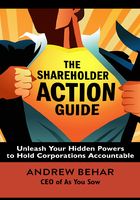
DOES ENGAGEMENT HARM CORPORATE PERFORMANCE?
There are simple ways that every investor can directly impact and shape their investments to align with their values. You may be surprised to learn that the corporations that are more responsive to their shareholders and enact more positive ESG policies have improved performance. In fact, according to a Deutsche Bank Group report that looked at “more than 100 academic studies of sustainable investing around the world and then closely examined and categorized 56 research papers as well as two literature reviews and four meta studies,” the often-held assumption that sustainable investing yields “mixed results” is not accurate. In fact, the report shows that “Corporate Social Responsibility and most importantly, Environmental, Social, and Governance” (ESG) factors are correlated with superior risk-adjusted returns.” Furthermore, they state that 89 percent of the studies show that companies with high ESG ratings exhibit market outperformance and that “SRI fund returns show neutral or mixed results.”
that looked at “more than 100 academic studies of sustainable investing around the world and then closely examined and categorized 56 research papers as well as two literature reviews and four meta studies,” the often-held assumption that sustainable investing yields “mixed results” is not accurate. In fact, the report shows that “Corporate Social Responsibility and most importantly, Environmental, Social, and Governance” (ESG) factors are correlated with superior risk-adjusted returns.” Furthermore, they state that 89 percent of the studies show that companies with high ESG ratings exhibit market outperformance and that “SRI fund returns show neutral or mixed results.”
This finding is backed up by research from TIAA-CREF that reports, “A TIAA-CREF analysis of leading SRI equity indexes over the long-term found no statistical difference in returns compared to broad market benchmarks, suggesting the absence of any systematic performance penalty.”
that reports, “A TIAA-CREF analysis of leading SRI equity indexes over the long-term found no statistical difference in returns compared to broad market benchmarks, suggesting the absence of any systematic performance penalty.”
In addition, the California Public Employee Retirement System (CalPERS), the largest pension fund in the United States, has found that when it engages with companies in its portfolio, it sees increased returns. “Approximately 188 companies selected by the Pension Fund publicly and privately since 1987 on average outperformed the Russell 1000 by 14.4 percent over the five years after CalPERS began engagement, commonly referred to as the “CalPERS Effect.” The companies lagged the index by nearly 39 percent in the three years prior to CalPERS involvement.
Finally, a June 2015 survey by the Certified Financial Analyst Institute (CFA) indicated that 73 percent of portfolio managers and research analysts take ESG issues into account in making investment decisions, with governance being the most common concern.
(CFA) indicated that 73 percent of portfolio managers and research analysts take ESG issues into account in making investment decisions, with governance being the most common concern.

Figure 3: The responsible investing index with the longest track record, the MSCI KLD 400 Social index, started in 1990 as the Domini 400 Social Index. It is one of the first SRI indexes and has outperformed the S&P 500 index since its inception. If you had invested $1 million in 1990, you would have made $10 million in the S&P and $11 million in the MSCI KLD 400. Source: MSCI. Reprinted with permission. MSCI retains all other rights, title, and interest in and to the work.
started in 1990 as the Domini 400 Social Index. It is one of the first SRI indexes and has outperformed the S&P 500 index since its inception. If you had invested $1 million in 1990, you would have made $10 million in the S&P and $11 million in the MSCI KLD 400. Source: MSCI. Reprinted with permission. MSCI retains all other rights, title, and interest in and to the work.
This should not be a surprise. Companies that are less engaged with their shareholders are less open to new ideas and may not perceive risks. After all, a better management team—more aware of the impacts of corporate policy—will make better decisions and long-term investments to optimize efficiency and reduce risk. These attitudes at the board and management levels translate into long-term sustainable growth and become woven into the DNA of the corporation.